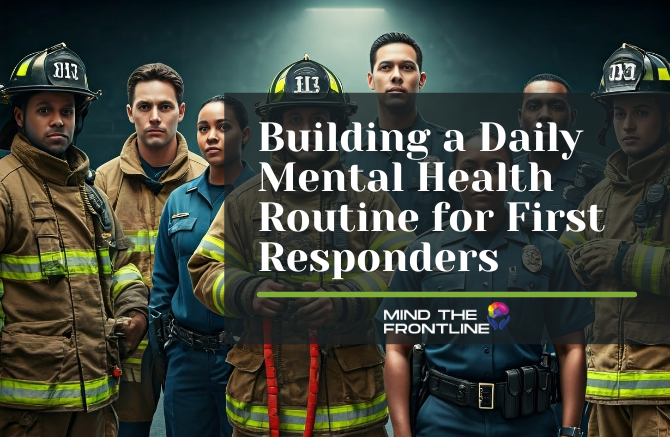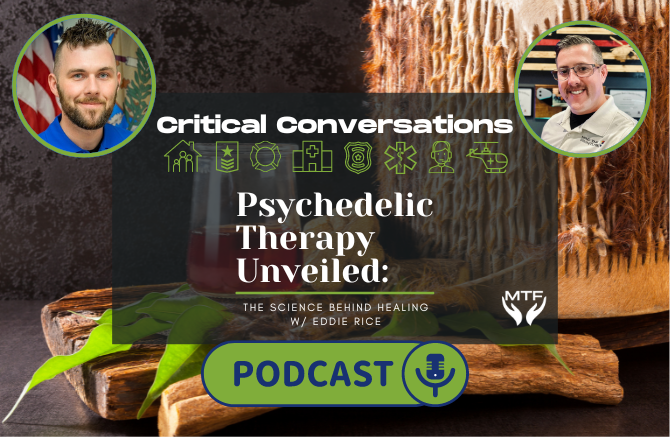The 4 Pillars of Self Care: Physical, Emotional, Mental, and Spiritual for First Responders and Veterans
Unlock the secrets to holistic well-being by mastering the four pillars of self-care, crucial for first responders and veterans.
5 min read
 Chris Smetana, AS, FP-C, CCP-C, NRP | Founder/President
:
Feb 19, 2025
Chris Smetana, AS, FP-C, CCP-C, NRP | Founder/President
:
Feb 19, 2025
-2.png)
Inner child healing offers transformative benefits for first responders and veterans, helping them navigate the emotional scars of their demanding roles.
First responders and veterans often face immense stress and trauma due to the nature of their work, which frequently involves life-threatening situations, witnessing human suffering, and making split-second decisions that can have profound consequences. These experiences can lead to a buildup of emotional and psychological strain over time. While they are trained to handle external crises with precision and calmness, the internal emotional toll can be significant and long-lasting, often manifesting as anxiety, depression, or post-traumatic stress disorder (PTSD). Inner child healing addresses these deep-rooted emotional issues by delving into the subconscious mind where these traumas are stored, providing a pathway to emotional recovery and overall well-being. This therapeutic approach allows individuals to explore and understand the origins of their emotional pain, often rooted in childhood experiences, and to release the negative emotions associated with them.
By engaging in inner child healing, first responders and veterans can reconnect with their deeper selves, heal past wounds, and cultivate a sense of peace and resilience. This process involves acknowledging and embracing the vulnerable parts of themselves that have been neglected or suppressed due to the demands of their roles. Through techniques such as guided visualization, creative expression, and therapeutic dialogue, they can learn to nurture their inner child, fostering self-compassion and acceptance. This process is essential for maintaining mental health and improving the quality of life, as it empowers individuals to break free from the cycle of emotional distress and to build a more balanced and fulfilling life. By addressing these foundational emotional issues, first responders and veterans can enhance their capacity to cope with stress, improve their relationships, and find renewed purpose and joy in their personal and professional lives.
-Feb-11-2025-08-20-01-3067-PM.png?width=401&height=262&name=Blog%20Section%20Pictures%20(4)-Feb-11-2025-08-20-01-3067-PM.png)
The 'inner child' refers to the childlike aspect of our psyche that holds our deepest emotions, memories, and experiences from childhood. This concept is crucial in understanding how past experiences shape our current emotional responses and behaviors, as it encompasses the innocence, creativity, and vulnerability that we often carry into adulthood. The inner child is not just a metaphorical idea but a real part of our subconscious that influences how we perceive the world, react to stress, and form relationships. It is the part of us that remembers the joy of simple pleasures, the pain of early disappointments, and the lessons learned from our earliest interactions with the world around us.
Inner child healing involves acknowledging and nurturing this part of ourselves, which can be particularly beneficial for those who have experienced trauma. This process requires us to delve into our past, to revisit and understand the formative events that have left lasting impressions on our psyche. By addressing the needs and wounds of our inner child, we can foster emotional healing and develop healthier coping mechanisms. This healing journey allows us to confront and release the negative emotions and limiting beliefs that have been carried from childhood, enabling us to break free from patterns of behavior that no longer serve us. Through this nurturing process, we learn to offer ourselves the compassion, understanding, and support that may have been lacking in our early years, ultimately leading to a more integrated and harmonious sense of self.
-Feb-11-2025-08-21-58-6072-PM.png?width=401&height=262&name=Blog%20Section%20Pictures%20(5)-Feb-11-2025-08-21-58-6072-PM.png)
First responders and veterans often encounter unique emotional challenges, including PTSD, anxiety, depression, and feelings of isolation. The high-stress environments they work in can lead to emotional burnout and difficulty in managing personal relationships.
These professionals may also struggle with unresolved childhood traumas that are exacerbated by their demanding roles. Inner child healing provides a targeted approach to address these compounded issues, promoting emotional resilience and recovery.
-2.png?width=401&height=262&name=Blog%20Section%20Pictures%20(6)-2.png)
Several techniques can be effective in inner child healing, including mindfulness meditation, journaling, and therapy. Mindfulness meditation is a practice that encourages individuals to focus on the present moment, fostering a sense of calm and clarity. By concentrating on their breathing and bodily sensations, individuals can cultivate a state of awareness that helps them manage stress and reduce anxiety. This practice not only aids in calming the mind but also enhances emotional regulation, allowing individuals to respond to their emotions with greater understanding and patience. Journaling, on the other hand, serves as a powerful tool for self-reflection and emotional expression. By writing down thoughts and feelings, individuals can explore and process deep-seated emotions, gaining insights into their subconscious mind. This practice can uncover hidden patterns and beliefs that may be influencing their current behavior, providing a pathway to self-discovery and healing.
Therapeutic approaches such as Cognitive Behavioral Therapy (CBT) and Eye Movement Desensitization and Reprocessing (EMDR) can also be beneficial. CBT is a structured, goal-oriented therapy that focuses on identifying and challenging negative thought patterns. By reframing these thoughts, individuals can alter their emotional responses and behaviors, leading to improved mental health and well-being. EMDR, on the other hand, is a specialized therapy designed to help individuals process and integrate traumatic memories. Through guided eye movements, EMDR facilitates the reprocessing of distressing memories, reducing their emotional impact and allowing individuals to heal from past traumas. These methods, when used in conjunction with other healing practices, provide a comprehensive approach to emotional recovery, enabling individuals to release the burdens of their past and move towards a more balanced and fulfilling life.
-2.png?width=401&height=262&name=Blog%20Section%20Pictures%20(7)-2.png)
A strong support system is crucial for long-term healing. This includes professional support from therapists and counselors, as well as personal support from family and friends who understand and empathize with the challenges faced by first responders and veterans.
Joining support groups or communities can also provide a sense of belonging and shared understanding. These networks offer a safe space to share experiences and gain insights from others who have undergone similar journeys.
-2.png?width=401&height=262&name=Blog%20Section%20Pictures%20(8)-2.png)
Starting the reparenting journey involves several practical steps that are essential for fostering emotional healing and personal growth. First and foremost, it is crucial to acknowledge the need for healing, which requires a deep sense of self-awareness and honesty. This step involves recognizing the emotional wounds and patterns that have been carried from childhood into adulthood, and understanding how they impact your current life. Be compassionate towards yourself during this process, as self-compassion is a vital component of healing. It allows you to approach your inner struggles with kindness and understanding, rather than judgment or criticism.
Next, take the time to identify and understand the specific needs of your inner child by reflecting on past experiences and emotions. This reflection can be facilitated through journaling, meditation, or therapy, where you explore the memories and feelings that have shaped your inner world. By doing so, you can uncover the unmet needs and unresolved emotions that your inner child holds, providing insight into the areas that require attention and care.
Engage in activities that nurture your inner child, such as creative expression, play, and self-care routines. Creative expression can include drawing, painting, writing, or any other form of art that allows you to express your emotions freely. Play is equally important, as it reconnects you with the joy and spontaneity of childhood, helping to release stress and foster a sense of freedom. Self-care routines, such as regular exercise, healthy eating, and adequate rest, support your overall well-being and create a nurturing environment for healing.
Seeking professional guidance can also provide structure and support as you navigate this healing process. Therapists or counselors who specialize in inner child work can offer valuable insights and techniques tailored to your unique needs, helping you to address deep-seated issues effectively. Remember, reparenting is a gradual journey that requires patience and consistency. It is not a quick fix but a long-term commitment to nurturing and healing your inner self. By approaching this journey with dedication and an open heart, you can cultivate a more balanced, fulfilling, and harmonious life.
-2.png?width=401&height=262&name=Blog%20Section%20Pictures%20(9)-2.png)
Don't Suffer Alone!
Get your copy of Back in Service: Frontline Stories of Resilience. This collection includes stories from frontline workers and their families from across the country with each author sharing a unique story about how their career has impacted them and details on how they have grown into a rejuvenated lifestyle of resilience.

Explore many valuable First Responder Mental Health and Wellness resources on Mind the Frontline's online platform. Discover the link below to access a wide range of support and information tailored specifically for first responders.
Additional Mind the Frontline Resource's
Stay connected with Mind the Frontline on Facebook & LinkedIn.
$BI-TAPP $50 DISCOUNT OFF CODE:frontline40
Transform Peer Support in Your Agency with Mind Shield LMS
At Mind the Frontline, we’re proud to introduce Mind Shield LMS, a game-changing platform designed to empower first responder peer support programs.
Key Features:
✅ Automated Educational & Motivational Emails
✅ Streamlined Follow-Up Task Creation
✅ Comprehensive Resource Library
✅ Customizable Dashboard
Why Mind Shield LMS?
✨ Boost efficiency: Automate routine tasks and focus on meaningful support.
✨ Ensure no one is left behind: Every request is tracked and addressed.
✨ Equip your team: Provide tools and resources for effective peer support.
💻 Start Today! Request a free 30-day trial and see the impact firsthand.
📩 Get Started Now: Request More Information
Join us in prioritizing the mental health and wellness of first responders. Together, we can build stronger, more resilient teams.
-3.png)
Unlock the secrets to holistic well-being by mastering the four pillars of self-care, crucial for first responders and veterans.

First responders face unique mental health challenges due to the nature of their jobs. Building a daily mental health routine can be a powerful tool...

Explore the world of Psychedelic Assisted Therapy for first responders and debunk common misconceptions surrounding this innovative approach to...